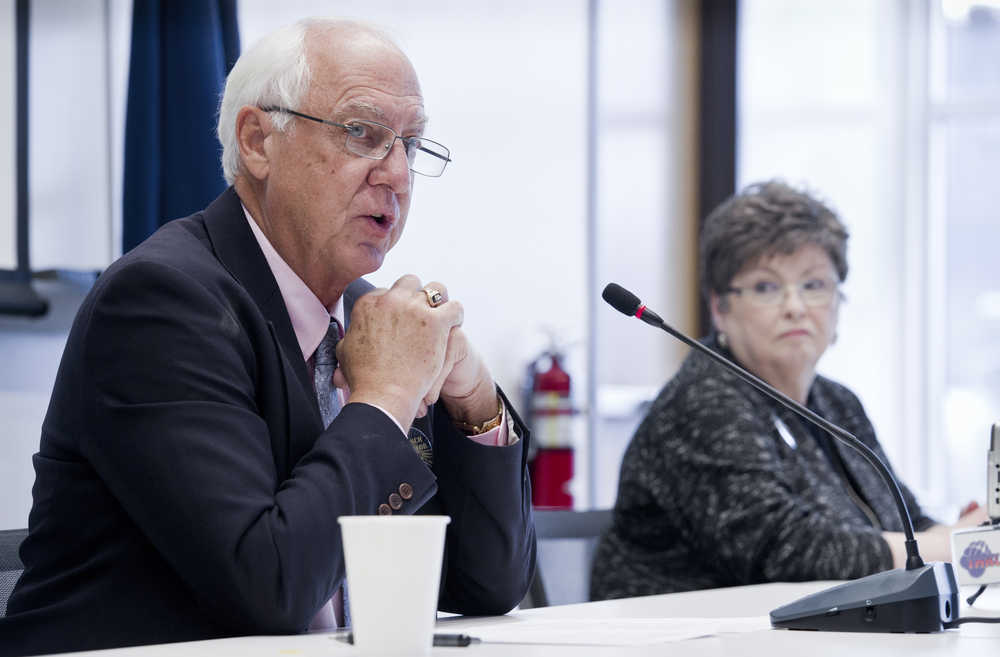At the Juneau Chamber of Commerce’s mayoral candidate forum Thursday afternoon, the greatest difference between candidates Karen Crane and Ken Koelsch was their take on Juneau Access.
After a lightning round of yes-or-no questions — during which Crane said she didn’t support building a road north out of Juneau and Koelsch said he did — forum moderator Mike Satre asked the candidates to unpack their positions on the road. Before doing so, he forewarned them that completing the Juneau Access Project is among the chamber’s highest priorities.
“This decision is now out of the hands of local government,” Crane told the audience, which filled the Alaska Room of the Juneau International Airport. “I don’t believe it’s a good time to be highlighting the deep divide we have in our community over this issue.”
She went on to say that Juneau Access is now a matter for the Legislature to consider. Instead, she said she would advocate a strong ferry system, which will help other Southeast Alaska communities, too.
Koelsch has consistently been a proponent of the road during the course of his campaign, and he didn’t change his tune Thursday. He, too, said that he would support a strong ferry system, but he said the road would bring $38 million per year into Juneau’s economy. He said his support for the road goes back to 9/11 and his role in law enforcement.
He also said that the Juneau Access Project would help give high school kids new things to do by providing them additional places to camp, hike, fish and hunt.
The candidates also differed, although not as drastically, when it came to economic development, another important topic for the chamber. Koelsch favored sticking to the suggestions laid out in the Juneau Economic Development Plan, which was published about this time last year. The plan calls for diversifying Juneau’s economy, strengthening infrastructure and building the senior economy, among other things.
“What we often do is go out and spend money on a plan, and then we put it on a shelf,” Koelsch said. “If we paid for it and we approved it, let’s use it.”
Crane said that the plan is excellent, but city government alone can’t implement it. She said that city officials will have to “forge partnerships” with the chamber, Juneau businesses, the university and other key players to bring the economic plan to fruition.
Before the event began, Satre told everybody in the crowd that the chamber had given copies of the forum questions to the candidates in advance. They weren’t able to study for the audience questions though.
One audience member asked Karen Crane about her campaign flier, which featured a picture of her sitting at her seat in the Assembly Chambers surrounded by her peers.
The audience member asked her if she was happy with her choice to include the photo in the brochure, which some Assembly members said was an attempt to mislead voters, and if she would do it again.
“No; the answer is no, but I still contend that there was nothing wrong with me using that photograph,” Crane said.
The Alaska Public Offices Commission dismissed a complaint against Crane’s use of the photograph in the flier late last month.
Another audience member asked the candidates what they thought Juneau should do to be a better partner to other Southeast Alaskan communities.
Taking an if-it-ain’t-broke approach, Koelsch said that he thinks Juneau has been good to other Southeast communities and we should continue “to provide the services we provide.”
Crane again advocated strengthening the stripped-down ferry system.
“As the ferry system weakens, so does our position as a hub for Southeast,” she said.
Satre concluded the event by asking everybody present to vote in the March 15 election, so that voter turnout is better than the 23 percent turnout from this fall’s election.
“Please go vote and grab all your friends and relatives and neighbors, and tell them to do the same thing,” he said.

